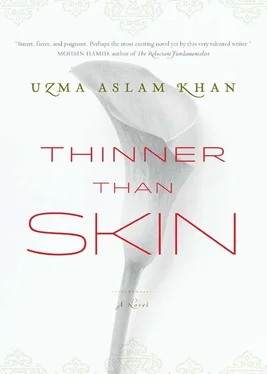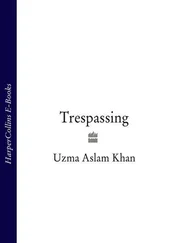She heard his head being smacked. “Do not lie.” It must have been his father.
The boy muttered an apology.
“In what shape did you see him?” another man asked, his voice distended in a grin. This man too she could recognize. On her wedding day, he had ogled her, then too with a grin. He had bid for her with one sick buffalo, nursing juniper brandy in his cup.
“The boy is too active in his head,” said the father, and there were mutters of support, the transgression swiftly forgiven.
She could hear teacups secured to the floor, hookahs inhaled. With one breath came eight words that spoke for them all. “Who even knows who is doing what anymore?” Followed by deep grunts of approval. “Dust rises when the cliff falls.” More approval, more gurgles of smoke.
After a while, a voice she did not recognize asked, “What about that man from your wife’s side? The one who has come back?”
On the other side of the wall, Maryam tried to keep very still.
“That crow on a stone.”
She flinched. It was a saying reserved only for the most mistrusted. Ghafoor was being accused of preferring to be by himself instead of with his family. This was not entirely fair, given that they had told him to leave, all those years ago.
“What about him?” The voice was Suleiman’s.
“Is he with the militants?”
This time the pause was so excruciating she wanted to knock on the wall, tell them to hurry up and answer.
“I saw him talking to them.” It was the voice she had not recognized.
There were murmurs of surprise. “What do you mean?”
“First he tried to talk to me. Something about the police and how we must stand up to them. How we could not be enslaved. How we could learn from the Uzbeks and the Uyghurs and the nomads of the steppe,” the man spit, “whose women are like men. He thinks he can come back after all this time and lead us? If you want to lead, stand in line.”
There were shouts of “Well said” and “That one never brought us anything but trouble” and “Now he is back, he will bring worse.”
“No.” Suleiman’s voice was surprisingly firm. “He is not with them.”
“No? His mouth is well-slit.”
A few men laughed.
“Indeed.” Sulemian cleared his throat. “It is because he is full of contradictory speech that my wife’s family turned to him. As you know, I have wanted no compensation for our loss.”
There were murmurs of support, and the air was filled with blessings for Kiran.
“It is the will of God.”
“It is the will of the skies.”
“It is the will of the mountains.”
“It is the will of the goddess.”
At this last there was much shifting and throat-clearing. Maryam knew it was the father of the child who had spoken out of turn. Clearly, the child had taken after his father, for people did not call out to the goddess in public anymore.
It seemed the only way to end the awkward silence was by steering the conversation back to the crow on the stone.
“Are you sure he is not with the militants?”
“I am sure,” said Suleiman, his voice still unyielding.
“If he is, he can tell us what to do,” countered another voice, also a stranger’s.
“If he is, he will not tell us what to do,” said Suleiman. “But I have said he is not. He is with other men. Men who might have contacts with these men, but who have different interests. I do not know what. But I know it is not Sunni jihad.”
“What is it then?”
Perhaps Suleiman knew she was there. She had listened to their chatter on many nights, after her family had eaten and the children were in bed. Perhaps each time he returned to her from the baithak, her eyes revealed all that her ears had received.
“Well?” repeated the peeved voice. “If he is not with them, what is it he wants?”
“Justice.”
“Justice?”
Then Maryam heard a sound, unnatural, like winter rain, or summer snow. It fell everywhere around her, from high above the wall. No, it was neither snow nor rain. What fell was far worse. It was the sound of men bonded together in derisive laughter.
She moved away from the wall, out into the open air, into her true home.
The night was moonless and thick with moisture. She searched for stars but not one revealed itself. She searched for Ghafoor but he was gone. Perhaps trailing the foreigners further north. She had heard nothing from him since their last meeting. Remembering the meeting left her aching for the way she used to think of him. Wherever he was now, she hoped he might see some stars. And when he did, she knew he would not point, no matter how inebriated, or enraged. They only point at what takes away life .
It pained her, too, the way the people of the valley regarded him. In the past, they had shown him both respect and fear. To the young, especially, he had been a hero, even if, to the old who carried the burden of honor, he was an embarrassment. But now, while some did not even know of him, others dismissed him outright. Had they not heard of his courage, the way he showed the forest inspector what happened to those falsely accused of a crime? Did they not pass the inspector’s burned house, and cringe? Did they not see his dead wife’s ghost, hear her children scream? No, apparently not. And, apparently, she had been proud of him for doing it, though she had not been able to admit it till now.
Though change was a part of their way, not this change, not this Ghafoor, the one who had become a stray.
She understood now that the way he had looked at her the last time said he was searching for his own worth. If others had rejected him, was she going to do the same? If he could not be a leader of his men, could he not even own a piece of her? Though their alliance depended on restraining desire, he still expected to be desirable to her. This was to be depended on. Though everything else must change, these were the two fixed variables of their love— never consummate our love, never overcome it . He had looked at her expecting this assurance, and was angry when he could not find it.
She walked back into the hut. Her free hand pulled a cup from off a plank behind which she hid their remaining supplies, including the brandy. Her children were asleep. On the other side, the men still talked. She poured a little brandy, her mind still churning.
She feared this change the most: could it be that her trader and merchant, the one with the vodka stench in place of the garlic tang, the desperate leer in place of the honey, did not have the fight in him anymore? Could it be that he was following the foreigners to the north to no purpose? He clearly needed cradling, but she was in no condition to offer this, even if she wanted to, which she did not. Not after all the effort it took to keep her broken heart from growing cold.
She carried the cup into the forest. No matter how bad things got in the valley, no matter how badly the herders were caught between the government and the militants, what happened to Kiran could not be forgotten. The fight had not left her. If only she could take Ghafoor’s place, as he trailed the foreigners.
The trees before Maryam rose higher in the dark than during the day. She could name each shadow. Diar, bhentri, chalai. There were also shadows closer to earth, plants whose rhizomes and leaves cured ailments from insomnia to gonorrhea, and even cancer. She recited these names too — asmani booti, birmi, and of course, muther. She rubbed the soil between her fingers, her eye keen, searching for the ginger beloved to the animals.
The year the sheep ate the two ginger stems and they were forced to pay the fine, her mother had said something that now, as the warm, acid sweetness of juniper seeped through her pores, Maryam at last understood. Caressing the ginger root, her mother had said the ewe was wise to eat it. She said the best things in life were like the ginger plant, pungent, plentiful, and most of all, horizontal, with no clear beginning or end. Always on the move, in the middle, between things, between being. Leave the vertical world to trees and mountains. Everything else with any sense at all — including gods and jinns — moved like the ginger plant: parallel to the horizon, to reach whatever space was available.
Читать дальше












